Grand Master Joe Haldeman is perhaps best known for The Forever War, the seminal first novel in his military sci-fi series. The book was largely inspired by Haldeman’s own experiences as a young man drafted for Vietnam, and is deservedly considered a classic. However, Haldeman’s impressive oeuvre is more far-ranging and varied than the Forever War series alone.
Joe Haldeman's Early Years
Joe William Haldeman was born June 9th, 1943 in Oklahoma City. His family moved often, and Haldeman's childhood and adolescence were spent in places as far-ranging as Alaska and Puerto Rico. In adulthood, he would say that these frequent re-locations gave him a sense of home as a fluctuating place. Throughout the family's many moves, young Haldeman oriented himself by looking at the stars, planning to one day visit the distant planets he saw through his telescope lens.
Another constant in his life was science fiction. From the first sci-fi book he ever read—Rocket Jockey by Lester del Rey—Haldeman was hooked. He began writing his own sci-fi stories in grade four in the form of comic strips.

Sean McMullen (L.) and Joe Haldeman at a signing in 2004.
Photo Credit: Dotan Dimet / Flickr (CC)In 1963, Haldeman applied his fascination with sci-fi and space to studying physics and astronomy at the University of Maryland. In 1965, 22-year-old Haldeman married Mary Gay Haldeman (née Potter). As of this writing, the couple have been married 54 years.
After graduating with a degree in astronomy, Haldeman applied for a naval observatory job in Argentina. He was interested in the role in part because he felt the job would allow him time to explore his interest in writing. But while waiting to hear about the position, Haldeman and his family received the letter they had been dreading.
RELATED: 10 Major Hard Science Fiction Novels
In 1967, the young couple returned from a vacation to find a draft notice had arrived. Haldeman had anticipated this moment; in addition to submitting for the naval job, he’d also already applied to the Peace Corps. As Haldeman later wrote on his website, "I had applied to the Peace Corps as well, saying I'd rather spend six years digging ditches in Africa than one year killing people in Vietnam, but they never responded.”
Haldeman also attempted to apply for conscientious objector status, but as an atheist he couldn’t acquire the letter from a minister he understood the draft board needed to consider his request. And now, it was too late.
Joe Haldeman's Time in Vietnam

The cover of Joe Haldeman's War Years.
Hoping to avoid fighting a war he didn’t believe in, Haldeman even considered jail or moving to Canada as alternatives. However, he dreamed of becoming an astronaut through a now-retired NASA program which recruited scientists, an opportunity which he knew would disappear if he didn't go to Vietnam.
Decades later, Haldeman wrote that America’s jingoism also had a subtle and unconscious impact on his reaction to the draft notice: “My pacifism was closely reasoned and, I thought, deeply felt — but I was a post-WWII American male who had grown up on John Wayne movies and GI Joe comics, and there was something in me that deeply wanted to prove that I could soldier.”
Haldeman arrived in Vietnam on February 29th, 1968. In his role as a combat engineer, he felt there was very little chance of he and his comrades getting out alive and unscathed. His prediction came true: While working as a demolition engineer, Haldeman and his squad were surprised by a booby-trapped cache of munitions. Haldeman survived, and was later awarded the Purple Heart.
RELATED: 13 Classic Science Fiction Books Everyone Should Read
"I was a post-WWII American male who had grown up on John Wayne movies and GI Joe comics, and there was something in me that deeply wanted to prove that I could soldier.”
When Haldeman eventually returned home after the injury, he found his writing had changed. As he later told National Public Radio, although he suspects he would have been a writer in some capacity no matter what, his experiences in combat contributed to his becoming a professional author.
Within weeks of returning from Vietnam, Haldeman sold two stories he had written before his service. At the time he still thought writing would be a side occupation, and prepared to pursue a career in computer science. But his passion for writing was nurtured by the Milford Writer’s Workshop, an annual writing group held by seminal sci-fi author Damon Knight, who in 1965 had founded the Science Fiction Writers of America (SFWA). At these writing retreats Haldeman collaborated with some of the biggest names in speculative fiction, including Harlan Ellison, Ben Bova, and Gardner Dozois.
The Milford Workshop was pivotal for Haldeman's career. While sharing a beer, Haldeman told Bova about his ambition to write a literary fiction novel based on his time in combat. Bova offered to forward a recommendation to his publisher. Haldeman wrote sample chapters for War Year, Bova followed up on his half of the agreement, and eventually Haldeman was offered a contract for his first novel.
RELATED: Ten Transportive Ben Bova Books
1972
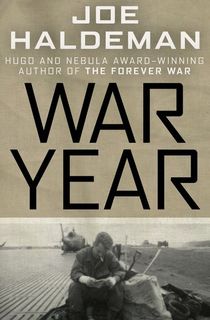
War Year
Joe Haldeman's debut novel War Year follows combat engineer John Farmer as he fights to survive the brutality of Vietnam in 1968.
The largely autobiographical novel was structured around almost-daily letters Haldeman wrote to his wife while in Vietnam, as well as “the things I remembered seeing but had been reluctant to write to her about.” Haldeman had kept meticulous records during his time in combat because, as he later wrote for The Portalist, he felt if he were to "write at least one page every day [...] that after 366 days I would have enough material for a novel."
Joe Haldeman: Professional Author
After Haldeman returned from Vietnam, he and his wife moved to Florida. There Haldeman wrote full time, penning short stories—some of which would later be published in his anthology Cosmic Laughter—and starting his novels All My Sins Remembered and The Forever War.
1977
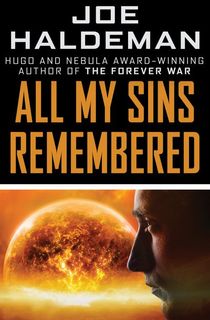
All My Sins Remembered
Buddhist Otto McGavin is a pacifist, but the brutal Confederación wants to change that. A hyper-secret organization, the Confederación's professed goal is to protect all life throughout the galaxy, both human and alien. At first, a Confederación job seems like a dream for Otto...but his new bosses will change his body and spirit in nightmarish ways.
RELATED: 8 Military Sci-Fi Books Set in a Galaxy Far, Far Away
In 1973 the couple drove from Florida to the Midwest so Haldeman could learn from the best of the best at the Iowa Writer’s Workshop, an acclaimed program for developing writers.
At Iowa, Haldeman studied with renowned authors like Raymond Carver and Stanley Elkin. The latter viewed science fiction as worthless, which prompted Haldeman to begin work on what would later become his novel 1968. This anti-sci-fi sentiment was present throughout his time at Iowa; at one point, Haldeman presented the beginning of his novel Mindbridge at a master class and was criticized for devoting his time and energy to science fiction. Soon after, he sold Mindbridge for a record-breaking price.
1984
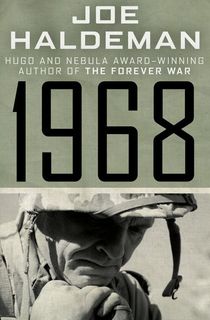
1968
1968 follows the experiences of John “Spider” Spiedel, a college dropout drafted for the Vietnam War with personally disastrous consequences. Haldeman had difficulty finding a publisher for the novel because at the time there was limited interest in books about Vietnam. 1968 eventually found a home with St. Martin's Press, the 18th publisher Haldeman submitted it to.
1976
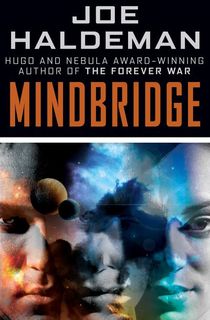
Mindbridge
Jacque Lefavre is a Tamer with the Agency for Extraterrestrial Development tasked with preparing distant worlds for human colonization. Revolutionary technology allows Tamers like Jacque to visit far-flung planets with unprecedented ease. But when he and his team arrive on the world of Groombridge, they're totally unprepared to interact with the life they find.
In his final semester at Iowa, Haldeman did his part to spread the good news of science fiction around campus. He taught a science fiction class which eventually evolved into a club called Science Fiction League of Iowa Students (SFLIS)—an unfortunate acronym Haldeman himself claims responsibility for. Additionally, his sci-fi MFA thesis novel The Forever War went on to win both a Hugo and a Nebula Award, and to be one of the most enduring novels about the Vietnam War in any genre.
1974
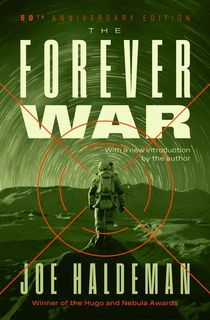
The Forever War
Physics student William Mandella is drafted to fight the alien Taurans as part of the United Nations Exploratory Force. As Mandella struggles to stay alive during his two years of combat, time back home on Earth progresses at its own pace. Due to the inescapable physics of faster-than-light-speed travel, when Mandella returns to Earth he finds decades have passed in the lives of those he left behind.
Haldeman's highly-autobiographical novel was praised by Neuromancer author William Gibson, who wrote "to say that The Forever War is the best science fiction war novel ever written is to damn it with faint praise." It went on to win the 1975 Nebula Award and 1976 Hugo Award. The Forever War has been adapted into a stage play, a French and English comic book series, and a film adaptation has long been in the works.
Joe Haldeman: Life After Iowa
After graduating in 1975, Haldeman explored a number of exciting new projects, including a series of Star Trek novels. Since he had been in Vietnam when the show came out, Haldeman had to prepare by immersing himself in the fandom. His first Star Trek novel, Planet of Judgment, hit shelves in 1977. It follows the Enterprise crew as they explore the planet Anomaly, so-called for the malfunctions it causes in their weapons and other equipment.
Star Trek wasn't the only property Haldeman brought his literary credentials to. He also worked as an imagineer for Disney's Epcot park alongside George Lucas, and briefly worked with Steven Spielberg on the novelization of Poltergeist. Haldeman was fired from the latter project after writing in editing notes that a draft of the script “suck[ed] eggs.” His time on Poltergeist was representative of many of his writing collaborations; as Haldeman told The Portalist in 2018, "My experiences with collaborating on novels and stories have been almost all negative, unless the project is a goof."
But Haldeman wasn't just adapting others' work: In 1983, the same year he became an adjunct professor at the Massachusetts Institute of Technology (MIT), he wrote a play adaptation of The Forever War that ran in Chicago. Soon after, he began work on Worlds, the first novel in his trilogy of the same name. Haldeman later described the novel as the first he had written about a narrator fundamentally different from himself.
The near-future series explores the life of Marianne O’Hara, a resident of the satellite world called New New York. Haldeman later said that he unconsciously wrote the novel about his own mother, who was in failing health at the time. She passed away a week after he completed the final novel in the series, Worlds Enough and Time.
1981-1982
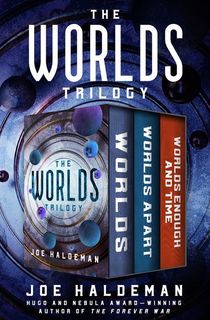
The Worlds Trilogy
In the near-future, the majority of humanity abandons Earth, living instead on satellite 'worlds' orbiting the dying planet. Joe Haldeman's Worlds Trilogy follows the life of Marianne O'Hara, a resident of the world New New York. As she faces inter-world battles and habitat devastation, Marianne evolves from a young and naive girl into a leader who will chart her species' journey to the stars.
RELATED: A Space Society Faces Destruction in Joe Haldeman's Worlds Trilogy
Soon after, Haldeman collaborated with his brother, author and scientist Jack C. Haldeman, on the novel There Is No Darkness. In the late 80s he also experimented with genre, penning his first Cold War-set espionage novel, Tool of the Trade.
1983
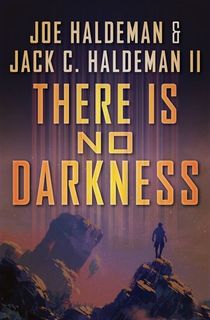
There Is No Darkness
Carl Bok is desperate to escape his life on an impoverished and desolate home planet. When he's offered a coveted scholarship to a spaceship-set school, Carl feels his life is finally beginning. But when a need for funds forces Carl to literally battle for his dreams, he fights humans and aliens alike in sponsored competitions. As Carl struggles to make his aspirations a reality, he and his fellow students are unaware of the larger forces manipulating their intergalactic struggles.
1987
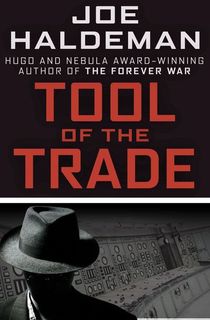
Tool of the Trade
After surviving the battle of Leningrad, Nicholas Foley moved to America and became a noted university professor. But his respectable life hides a shocking secret: Foley is a KGB spy. When Foley creates an incredibly dangerous new technology which robs people of their free will, he realizes he can no longer defend living life as a man torn between two countries. To save the world, Nicholas must choose a side.
RELATED: 10 Space Adventure Books That Will Have You on the Edge of Your Seat
In addition to his teaching obligations at MIT and his work on other projects, Haldeman continued to write prolifically in the 80s and 90s, publishing ten books and seven short story collections from 1980-2000. During this time he also won numerous awards, including (but not limited to!) three Hugos, one John W. Campbell Memorial Award, three Nebula Awards, and one World Fantasy Award.
Joe Haldeman: The Forever Author

From L. to R.: George R.R. Martin, Kim Newman, and Joe Haldeman in 2007.
Photo Credit: Catriona Sparks / Flickr (CC)Over the past two decades, Haldeman has continued to publish novels which demonstrate the potential of hard science fiction to change how we see the world around us — and the world of our future. He has maintained a staggering publication pace all while balancing his responsibilities at MIT, where he taught until retiring in 2014.
2002

Guardian
Set in 1894, 1952, and 2004, Guardian mines Haldeman's own experiences in Alaska to tell the story of Rosa Coleman. A student of science and physics, Rosa is an unconventional woman for the 1890s. Although she tries to settle into life as a a well-to-do mother and wife, her world is upended when she discovers a dark secret about her husband. Now running for their lives, she and her son Daniel escape to Alaska, where Rosa has a surprising encounter with a raven—one which leads her on a journey across time and space. According to Haldeman, Guardian answers the question "What should you do if a raven keeps appearing on your doorstep and giving you advice?"
In 2009, Haldeman was named a 2010 Damon Knight Memorial Grand Master by the Science Fiction and Fantasy Writers of America. The award recognizes lifetime achievements to the field of science fiction. Russell Davis, then-president of SFWA, described Haldeman as "an extraordinarily talented writer, a respected teacher and mentor in our community, and a good friend.”
In 2012, he was also inducted into the Science Fiction Hall of Fame.
Despite these accolades, Haldeman is not content to rest on his laurels. In addition to maintaining an impressive writing schedule, the now-76-year-old also explores his other passions, such as art and traveling (and sometimes both combined, as seen in the journal page below depicting a visit to Paris).

Illustrated page from Joe Haldeman's notebook exploring memories from France.
Photo Credit: Joe HaldemanHaldeman, who has won three Rhysling Awards for his poems, also continues to write poetry. Below, we are thrilled to share one of his poems from 2019, "upon their clay."
upon their clay
girls’ pottery:
a thousand or thousands of years
from now the clay they shaped and fired to amuse themselves
will have been broken up
into mysterious shards that still bear their fingerprints.
Statesmen who changed the boundaries of the planet
will be dust and their names forgotten,
while the girls’ identities
hide safe inside the earth
upon their clay.
In addition to his poetry and other creative outlets, Haldeman continues to be a prolific novelist, and intends to continue writing for the foreseeable future. As he told Locus in 2013 soon after retiring from MIT, "I’m not retiring from writing. The main reason for retiring from teaching is so I have more time to write. When you’re seventy you have to admit to yourself you’re an old man, and you have to ask yourself, 'How do I wish to spend my remaining time?' In my case, I want to write."
This post is sponsored by Open Road Media. Thank you for supporting our partners, who make it possible for The Portalist to continue publishing the stellar stories you love.
